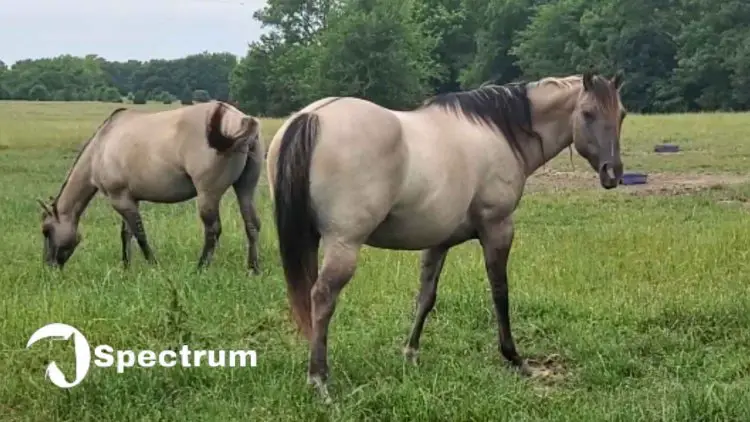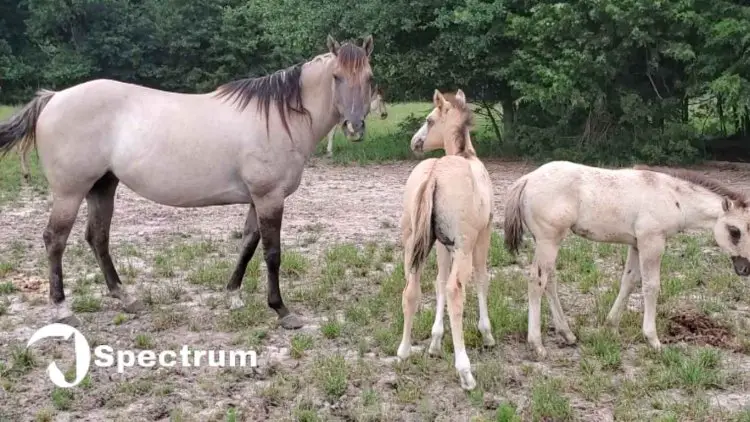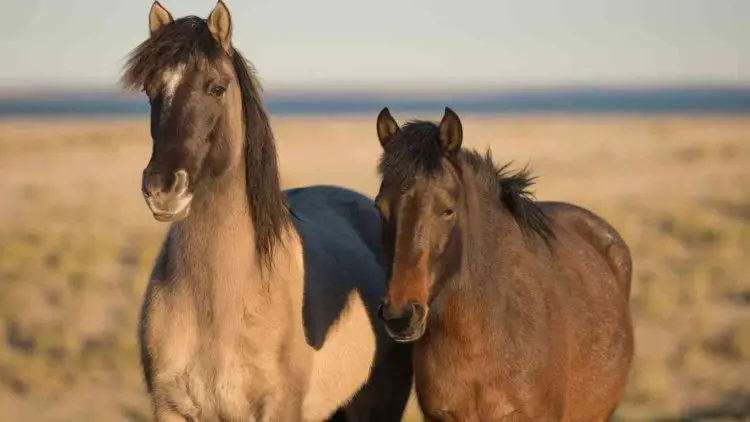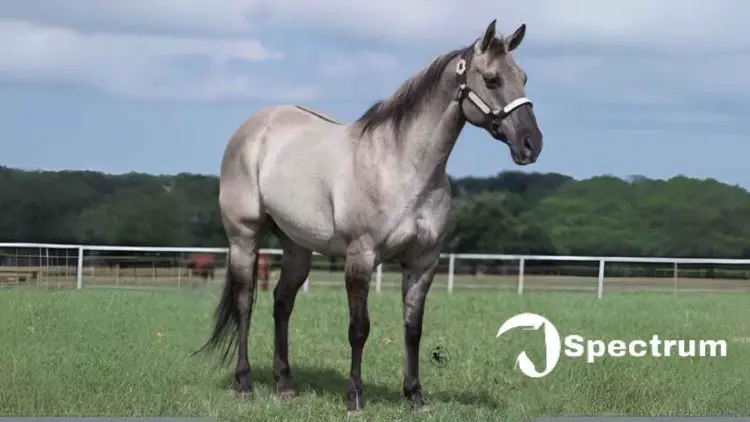All About Grulla Horses: Facts, Traits, Temperament & Breeding
Delve into the intriguing world of Grulla horses — a breed rich in history and adorned with distinct traits. Learn about the stunning Grulla, tracing its ancestral lines back to Spain's Andalusian and Baroque horses. Discover their significant roles within diverse societies, from their prominence among knights and conquerors in ancient times to their current popularity with ranchers and Western pleasure-riding enthusiasts. Uncover the unique coat color and stripe patterns that set Grulla horses apart and explore their physical characteristics and behavioral tendencies. Accurately informing yourself about their health, wellness, and genetic heritage is crucial in understanding and appreciating this distinctive breed. Choose to embrace the enigmatic charm of these creatures, as seen reflected in arts, literature, shows, and competitions, whilst acknowledging the essential conservation efforts directed towards their preservation.

Table of Contents
- Origins and History
- Importance in Various Societies
- Unique Features: Coat Color and Stripe Patterns
- Characteristics of Grulla Horses
- Understanding the Behavioral Tendencies of Grulla Horses
- Grulla Horses: A Look at Their Health and Wellness
- Exploring their Breeding and Genetic Heritage
- The Influence of Grulla Horses in Popular Culture
- FAQs
Origins and History
Grulla horses trace their roots back hundreds of years to Spain, with primary ancestry hailing from the Andalusian and Baroque horses. The Spanish conquistadors were responsible for bringing these steadfast creatures to the powerhouse known as the Americas. Over generations, these horses garnered appreciation far and wide for their distinctive color, impressive endurance, and versatility. Moreover, their robust structure and agility have grown popular, and they've often taken the spotlight in numerous historical narratives.
Importance in Various Societies
Grulla horses have held — and continue to hold — a significant place in numerous societies. These horses stood gallantly with knights and conquerors during the days of old and are notably treasured past and present. In our modern world, you'll find them popular among ranchers and fans of Western pleasure riding, esteemed for their exceptional perseverance and laid-back nature. From the Native American tribes to the Mexican vaqueros, the contribution of Grulla Horses to cultural heritage is undeniable. Whether as essential transportation means, in the heat of warfare, or during sacred ceremonies, these horses hold a key piece in the societal puzzle.
Related: A Closer Look at Friesian Andalusian Cross: Traits and Ancestry
Unique Features: Coat Color and Stripe Patterns

When you attempt to identify a Grulla horse, the immediate giveaway is their iconic mouse-colored "Grullo" coat. This color ranges from a lighter, silver, or blue-gray hue to a darker version leaning towards slate gray. This unique coat color, accompanied by primitive markings such as a line back and black legs, empowers the Grulla breed with its own singular identity.
Characteristics of Grulla Horses
Physique, Size, and Identification Key points
Grulla horses are generally medium-sized, packing a muscular physique and swift reflexes. They stand tall between 14 and 16 hands, boasting a fine head, straight to convex profile, and a strong physique. Their unique markings, which include a black dorsal stripe, dark ear edges, and leg barring, are hallmarks that make them easily identifiable.
Common Breed Traits
Grulla horses exhibit several common traits across the breed. They're admired for their sturdy build, durability, intelligence, and incredible knack for adaptation — all features that make them effective for various equestrian activities. They exhibit endurance and a commendable work ethic, fitting seamlessly into various roles ranging from recreational riding to more competitive disciplines.
Their mouse-dun, or Grulla, coat is considered the most rare and desirable of dun variants. It emerges from the unique interaction of the dun and black base color genes, providing Grulla horses with outstanding coat hues.
Understanding the Behavioral Tendencies of Grulla Horses

Temperament and the Personality Traits
Grulla horses exhibit calm, intelligent, and consistent behavior. Their resilient personality, fueled by an innate curiosity, is a luring trait for many. Their intelligent disposition and high receptivity make training them a relatively straightforward process, and their loyal character ensures ardent bonding with their caregivers.
Interaction with Humans and Other Animals
Grulla horses connect impeccably well with humans, eagerly learning and striving to please. They have been noted for their cooperative behavior, assisting humans across a variety of tasks, maintaining a sociable demeanor with fellow horses, and patience with other farm animals. Their adaptable nature assists them in forming good relationships with other species, facilitating harmonious cohabitation within shared spaces.
Adapting to Environments: Indoors vs. Outdoors
Grulla horses are known for their adaptable nature, comfortably thriving both indoors in stables and outdoors in pastures. Their robust resilience, passed down from their ancestors who lived in the rough conditions of the wild, prepares them to calmly navigate various environments. This exceptional survival instinct, honed through centuries, motivates them to adjust seamlessly across diverse living conditions.
Grulla Horses: A Look at Their Health and Wellness
Typical Health Concerns and Their Management
Like any other horse breed, Grulla horses may potentially face health issues. The typical problems encountered include lameness, colic, and respiratory issues. Regular health examinations from veterinary professionals, suitable management, and proper care play vital roles in maintaining their overall health condition.
Dietary Essentials and Nutritional Needs
A good diet is really important for keeping Grulla horses healthy. These horses need food with lots of high-quality hay and grains to get all the nutrients they require. They also need plenty of clean water. Depending on what they eat and how much exercise they get, supplements might help too. Talking to an expert in horse nutrition can provide useful tips on the best foods and feeding routines. The goal is a balanced diet that gives the horses everything they need to stay energetic and thrive.
Exercise and Mental Wellbeing of Grulla Horses
Attending to both the mental and physical wellness of Grulla horses is of great importance. Regular exercise for these horses ensures their bodies remain in good health, whereas mental stimulation, variety in their routines, and ample rest enhance their overall well-being. Providing them with consistent physical workouts, considerable grazing time, and positive interactions fosters a balanced mental state.
Exploring their Breeding and Genetic Heritage

Breeding Details and Ancestry Information
The genealogical lineage of Grulla horses closely ties back to Spanish equine breeds. Breeding of these unique-color horses demands conscientious matching between dun dilution-factored equines, typically with the goal of retaining or enhancing their distinctive Grulla coat. This intriguing coat results from certain genetic combinations donated by both parental lines. Acknowledging this lineage is integral for breeders aiming to produce this rare and desirable coloring in foals.
Genetic Factors Behind the Grulla Coat
The Grullo coat materializes from an amalgamation of the Dun and Black genes. This coat color is a spectacle of genetics, orchestrated by the convergence of the dun dilution gene and a black base color which results in the classic mouse-dun or slate gray coat, a highlight of the Grulla breed.
Conservation Updates and On-going Efforts
Through meticulous selective breeding, pure Grulla horses are relatively few in number. Conservation efforts are focusing on preserving the original lineages while ensuring the well-being and longevity of existing animals, given their unique genetic and cultural value. The Grulla coloring, being a rarity, has garnered the attention of many horse enthusiasts and breeding farms, leading to efforts to conserve this distinctive color. These conservation actions support genetic diversity, thereby contributing to the overall health and longevity of the equine population.
The Influence of Grulla Horses in Popular Culture
Reflections on Arts and Literature
The stunning beauty and relative rarity of Grulla horses have made them a favored subject in fields of art and literature. Many artists and authors have validly translated the horses' allure and rarity into creative expressions. Grulla horses, symbolic of nobility, resilience, and strength, often feature prominently in paintings, tales, and poetry.
Appearance in Shows and Competitions
Grulla horses are frequently seen participating in shows and competitions because of their magnificent presence and adaptability. Observing these equines in performance contexts highlights their versatility and talent, as they excel in various spheres ranging from dressage, reining, and show-jumping, to ranch work.
Current Popularity and Expectations for the Future
Grulla horses currently enjoy high popularity, driven by a growing appreciation for their unique coat and versatile capabilities. The future of the breed appears promising, as breeders and enthusiasts continue cherishing and taking proper care of these remarkable animals. Predictions affirm that public intrigue and interest among breeders are likely to increase.
FAQs
How to Tell if Your Horse is a Grulla?
Identifying a Grulla horse isn't always easy as their coat colors can exhibit a degree of variation. However, a classic telltale sign is the presence of a black or dark-colored dorsal stripe and the distinctive Grullo coat. Other clues such as body shading, which often becomes more evident during the summer season, can also help confirm a horse as a Grulla.
What Makes a Horse a Grulla?
A Grulla horse, pronounced "grew-ya," sets itself apart with its one-of-a-kind coloration. This distinct coloration is prominently recognized by a mouse-like or slate gray coat color, with nuances that fluctuate between light, silver-gray smoky blue, or a deeper shade of gray. Other signature markers of Grulla horses include a black dorsal stripe that extends from their mane to their tail, black stripes on their legs, and occasionally, on their shoulders or neck ("zebra stripes"). Though all Grullas sport the dun-colored coat, they owe their eye-catching Grulla coloration to each parent passing on a black gene.
Are Grulla horses rare?
Indeed, Grulla horses are considered a rarity. The specific genetic combination leading to the Grulla coloring doesn't occur quite frequently, rendering less commonly seen than horses of other colors.
Is Grullo a rare color?
The Grullo (or Grulla, the terms are frequently used interchangeably based on gender or regional preferences) color in horses is rarely seen. The parents of such a horse need to pass on the black gene along with one parent passing the Dun gene — a specific genetic combo that doesn't naturally occur quite often. This fact makes the Grullo a relatively uncommon and highly sought-after color in horses.
What's Your Reaction?

















